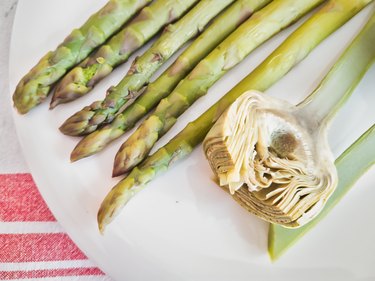
If you have diverticulitis and follow a healthy diet, you likely want to know what vegetables you can eat with a diverticulitis flare-up. While it's crucial to press pause on some veggies during a flare (and resume once symptoms clear), there are still certain types of veggies you can eat.
Avoid High-Fiber Vegetables During Flare-Ups
Video of the Day
Although vegetables are a key source of nutrients in your everyday diet, you'll want to take a break from fiber-rich veggies if you have diverticulitis. To understand why some vegetables are better than others, it helps to start with why these certain veggies are not ideal to eat during a flare-up.
Video of the Day
Cutting your fiber intake helps decrease bowel movements and ease gastrointestinal (GI) pain during a diverticulitis flare-up, which happens when small pouches of the colon called diverticula become inflamed or infected among people with diverticulosis, according to the Stanford University Medical Center.
"Fiber is the part of fruits, vegetables and grains that is not digested by the GI tract," says Birmingham, Alabama-based double board-certified gastroenterologist Wiley D. Truss, MD, MPH.
That said, if you're dealing with a particularly tough case of diverticulitis, you'll likely need to stick to a clear liquid diet for the time being. "During an attack or a flare of diverticulitis, you want to allow your [GI tract] to rest," Dr. Truss says. "Depending on the severity of the attack, we sometimes recommend a clear liquid diet for a day or two."
But if your diverticulitis flare is deemed mild by a health professional, you might be able to squeeze in some low-fiber veggie options.
"If it is a mild 'attack,' then we allow regular foods, but recommend a low-fiber diet during the attack," Dr. Truss says.
This means any raw vegetables, especially those with skins, are off limits for now. During a bout of diverticulitis, he recommends you avoid:
- Green peas
- Raw broccoli
- Turnip greens
- Brussels sprouts
- Potatoes with skins
Try Canned Vegetables
But, veggie lovers, worry not. There are some vegetables you can eat while your diverticulitis symptoms are healing, as long as your doctor clears you to do so.
Canned vegetables can be safe during a bout of diverticulitis, Dr. Truss says, as long as the veggies are skinless and well-cooked.
"The cooking process and avoiding skin is imperative to making sure you are sticking to a low-fiber diet," he says. Try the following canned picks:
- Potatoes
- Sweet potatoes
- Eggplant
- Beets
- Carrots
- Green beans
Try Cooked Veggies
Tender-cooked vegetables are great options if you're looking to get some produce in while healing from diverticulitis, according to the U.S. National Library of Medicine (NLM).
Per the NLM, the following veggies are safe, as long as they're cooked properly:
- Artichokes
- Asparagus
- Beets
- Broccoli
- Carrots
- Lima beans
- Mushrooms
- Sweet potatoes
- Pumpkin
- Squash
- Turnips
And if you choose to cook your veggies, be sure that no pulp or skins sneak into your dish, according to the Stanford University Medical Center.
Try Vegetable Juice
Fans of veggie juices can enjoy these sips during recovery from a diverticulitis flare-up, according to the NLM.
And, as with your cooked vegetables, if you choose to enjoy your veggies in juice form while recovering from diverticulitis, be sure your selection is free of pulp, per the Stanford University Medical Center.
Eat These Foods Post-Diverticulitis Attack
Even though avoiding fiber will help your colon heal during a diverticulitis attack, adding fiber back into your diet afterward will be key to warding off future flare-ups, Dr. Truss says.
"After the episode of acute diverticulitis has resolved, it is actually important to slowly add in fiber until you are on a high-fiber diet. This is the only dietary modification that has shown to decrease future episodes of diverticulitis," he says.
According to the Cleveland Clinic, high-fiber options you can incorporate after an attack include:
- Beans
- Fruits and vegetables (especially those with skins, according to Dr. Truss)
- Legumes
- Whole grains
Related Reading
- Cleveland Clinic: “What Foods Should You Eat — and Avoid — on a Diverticulitis Diet?”
- Stanford University Medical Center: “Low Fiber Diet for Diverticulitis”
- U.S. National Library of Medicine: “Diverticulitis and Diverticulosis – Discharge”
- Wiley D. Truss, MD, MPH, double board-certified gastroenterologist, Gastro Health, Birmingham, Alabama
Is this an emergency? If you are experiencing serious medical symptoms, please see the National Library of Medicine’s list of signs you need emergency medical attention or call 911.